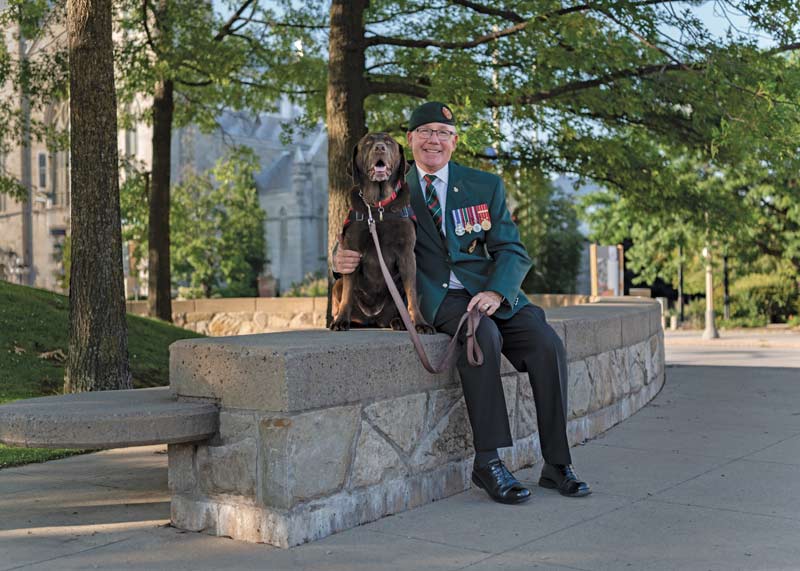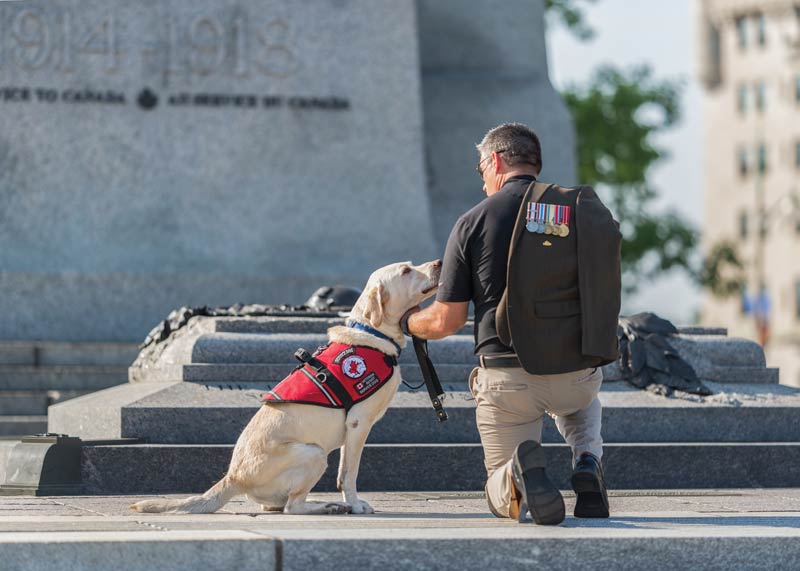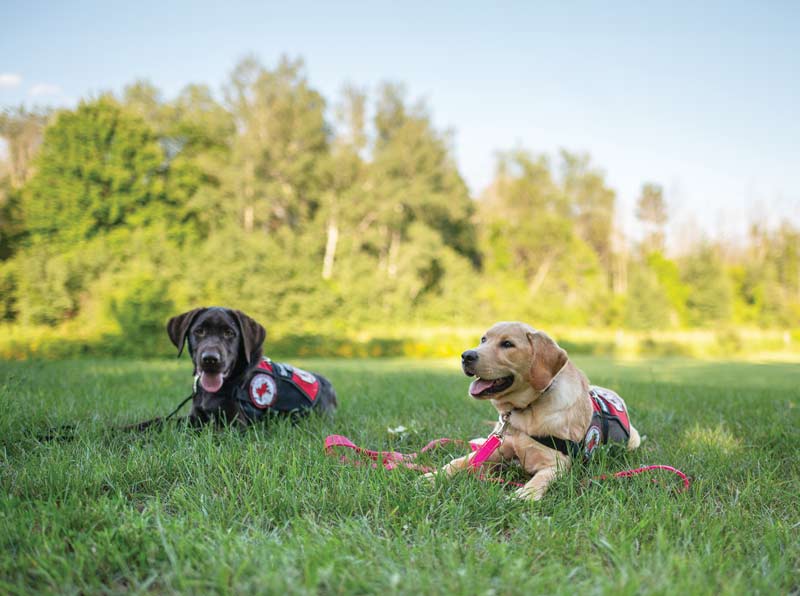I’m going to get theological on you.”
The playful line came from the mouth of Reverend R.M.A. (Sandy) Scott, an army chaplain who joined the Canadian Armed Forces in 1979, continuing a military legacy from his maternal family dating back to 1914. Originally serving in a naval reserve unit, he eventually transferred to the North Saskatchewan Regiment as its chaplain. Scott spent more than 24 years in the reserves.
Sporting rectangular, thin-rimmed glasses, a meditative demeanour and a shock of white hair, he looks the part of a man of God through and through.

Reverend R.M.A. (Sandy) Scott poses with his service dog Mandy at the Peacekeeping Monument in Ottawa.[photography: Josée Lavoie]
He knew life, its bits and brokenness, through spiritual eyes, and the Lord’s word was his means of expressing what he saw. And amid the beams of afternoon sun peeking through the lush red pines and balsam firs at the Canadian Veteran Service Dog Unit training centre in White Lake, Ont., God felt present.
“You can experience God’s grace and healing,” said Scott while sitting on a lounge chair inside a curtained gazebo. “These are two really important things theologically in terms of people’s faith.
“I believe God’s grace works through dogs.”
While some might have shrugged off the unorthodox prospect, Scott, the centre’s fundraising committee chair, kept an earnest sparkle in his eye. He recounted a story. His friend’s dog had recently passed, so he decided to read a book about a man who had also lost his canine companion. “This guy in the book was grieving in the same way,” said Scott. “While grieving, he had a vision, where Jesus came to him with a group of dogs. His dog came out of that pack and greeted him.
“And Jesus said, ‘I lent this dog to you for a while. These are all my dogs. I send them to help people. This is part of my grace and my healing.’”
At that moment, Scott’s emotions bubbled over, his voice trembling in the cool September breeze. “That’s how I’ve experienced it. My dog is a gift, a gift from the Divine.
“This dog is beyond.”

Scott and Mandy share a quiet moment. [photography: Josée Lavoie]
Scott’s chocolate brown lab, a service dog named Mandy, sat coiled at his feet. His therapist had referred him to the centre in 2016. He had been diagnosed with post-traumatic stress disorder. As chaplain, the death notifications and repatriations that followed during the War in Afghanistan had taken their toll.
“I had lots of problems, but because I was a clergyman, I couldn’t face them, and you had to keep up a facade,” said Scott. “So, my first marriage fell apart, and after that, it just was a cascade of horrible events.
“I was afraid. I was terrified.”
Mandy changed Scott’s life, however, in ways only a service dog can.
Service dogs have been used to aid the visually impaired for centuries. Today, there’s increasing evidence that the animals can help alleviate psychiatric conditions in veterans. A 2023 study facilitated by the University of South Australia, University of Adelaide and Military and Emergency Services Australia found that 90 per cent of veterans reported improvements in their PTSD, anxiety and depression within a year of working with a specifically trained dog.
Researchers in Canada have reached similar conclusions. “We’re not asking the question anymore if the dogs work—at least my team isn’t—because we already have very strong evidence,” said Linzi Williamson, an assistant professor in the department of psychology and health studies at the University of Saskatchewan. “It’s about trying to optimize and figure out the best path forward, not just for the veterans, but for the dogs.”
Despite such results and a commitment nearly a decade ago by Veterans Affairs Canada to establish national training standards, former CAF members such as Scott are still fighting to have VAC pay for their service dogs.
Showing her age only by the slightest token—grey hairs—Mandy remains as sharp as ever. Even with her service vest off, she appeared keenly aware of Scott’s needs.
“She’s reminding me right this minute, ‘We’re here. Stay grounded. Stay with me,’” said Scott.
Moments later, Scott’s wife Rae-Anne popped her head into the gazebo. Smiling with what seemed to be the most delightful secret, she said: “When you spell the word ‘dog’ backward, what do you get?”
The effects of PTSD are not easily undone, but Scott’s life had been touched and transformed by a dog’s love. At first, he was skeptical. Having trouble even going to the gym three times a week, Scott wondered why his therapist would recommend the help of a service dog.
“I said, ‘I can’t even take care of myself, let alone a dog,’” said Scott.
But Rae-Anne thought there was more to service dogs than just another four-legged responsibility. Scouring the internet, she came across the White Lake centre, and Scott’s therapist provided him a referral. Rae-Anne recalls the moment Scott first met the spunky brown dog: “That was the first time I saw him smile in years.”
Slowly, Scott discovered that Mandy provided him with something he had been missing for a while: routine. With every 7 a.m. wake-up call and morning and evening walk that Mandy fastidiously managed, PTSD’s cardinal symptoms of shame, guilt and self-deprecation began to fade. With this new schedule, Scott slept better, went out in public more, took fewer medications and became more physically and emotionally fit. Scott also lost 20 pounds within the first few weeks of working with Mandy.
“Mandy makes me a better person,” said Scott. “She makes me easier to live with. My wife doesn’t have to worry about me.
“This dog provides a lifestyle that’s healthy. And you can’t buy a lifestyle.”
Founded in 2012, the White Lake centre is a veteran-run charity that not only trains puppies and dogs for service, but also coaches veterans and first responders on how to work with them—for free. Its board of directors, responsible for advising on training standards and unit-specific programs, is comprised of veterans and first responders, dog trainers and a consulting psychologist.
“The dog trainers know the dog, the psychologist knows the person and the veterans that sit on the intake committee know the experience,” said Scott. “This is the difference with our dog unit compared to other service dog programs.”
The centre’s operating principles have helped save the lives of veterans more than once, with the unit issuing social welfare checkups for those showing signs of relapse—or worse. It keeps close contact with its clients even after they graduate from the program. And it requires them to meet with the unit at least four times a year for check-ins.
“We take care of each other,” said Scott. “And it’s membership for life as long as you want to be one of us.”
Working with Assistance Dogs International, a globally recognized authority in providing training principles for service dogs, the centre achieves impressive feats with its charges.
“We have dogs that pick up canes. We have dogs that open doors, grab pill bottles,” said the centre’s president, retired sergeant Dwayne Sawyer, who spent 23 years in the CAF. “It’s very important for us to find every little thing that that person needs help with so that we can build the perfect dog for them.”
For more than 15 years now, veterans’ organizations such as the White Lake training centre have asked that VAC endorse the use of service dogs and fully incorporate them into the varied mental health services it covers. But the pleas remain unanswered.
In the October 2022 government response to the standing committee on Veterans Affairs sixth report, “Incorporating Service Dogs into the Rehabilitation Program of Veterans Affairs Canada,” VAC acknowledged that “service dogs provided a reduction of PTSD symptoms, a moderate long-lasting reduction of depressive symptoms and a significant increase in the subjective feeling of well-being related to overall quality of life.”

Retired sergeant Dwayne Sawyer and his service dog Rex at the National War Memorial in Ottawa. [photography: Josée Lavoie]
However, the 2015 VAC-funded research project conducted by the Canadian Institute for Military and Veteran Health Research to which it attributed that response was ultimately dismissed as having limited results as nearly half of the participants—13 of 31—did not complete the study. Further, VAC’s chief psychiatrist, Alexandra Heber, told the standing committee on Veterans Affairs 18 months earlier that, “having a psychiatric service dog does not in any way have the evidence behind it to call this a treatment or a therapy.”
“[VAC] is saying there’s no clinical evidence,” said Scott. “That’s not an answer. It is an answer if you’re a politician.
“Guide dogs have been helping human beings for 300 years. There’s not going to be that [one] decisive clinical study,” he continued. “It’s insulting to think that that’s going to happen.”

Veteran Tina Sharp, a member of the Canadian Veteran Service Dog Unit, and her service dog Stoker.[photography: Josée Lavoie]
The standing committee report also called on VAC to “support and promote the creation of national standards for service dogs in Canada. However, the department seemingly distanced itself from that initiative, too. VAC responded that that “must come from industry itself and must employ the knowledge and expertise of such organizations as the Canadian General Standards Board.”
But as veteran Phil Ralph postulates, is it not the government’s distinct responsibility to create and regulate such services?
“This is what governments are supposed to do,” said Ralph, director of health services for Wounded Warriors Canada, a national mental health service provider that, among other things, runs a service-dog program in conjunction with The Royal Canadian Legion’s Ontario Command for veterans suffering with PTSD and operational stress injuries.
“An Aspirin’s purity is all regulated [by Health Canada]. But a dog, which is specially trained to give a person their independence and re-engagement with society and work on their life skills, is not regulated at all,” explained Ralph from Wounded Warriors’ headquarters in Whitby, Ont. “That’s kind of contradictory.”
Without standards, sham training programs and get-rich-quick breeders persist in the business. One veteran told Legion Magazine she had been duped by a couple of shady service-dog providers; she lost $2,000 and never heard from them again. Additionally, fake or improperly trained dogs undermine the public’s support for the service, especially if those dogs injure someone or destroy property.
“That’s just Fluffy in a vest,” said Ralph.
Coincidentally, in June 2015, Veterans Affairs Minister Erin O’Toole announced that national standards would be set for service dogs that assist veterans with mental health conditions such as PTSD. Up to $340,000 was approved to create the standards, while pilot research on veteran service dogs was provided $500,000 in funding.
“We expect this work will confirm what veterans have been telling us about the benefits of psychiatric service dogs—how these dogs have improved their quality of life,” said O’Toole nearly a decade ago. “The Government of Canada is committed to supporting research to achieve better outcomes for veterans with PTSD and other mental conditions.”
The federal government’s Canadian General Standards Board was tasked with the work, in consultation with veterans’ groups and members of psychiatric service dog training organizations.
But after deliberating for three years, it withdrew its intent to produce a national standard. The reason? A spokesperson for VAC told the CBC at the time that the board was unable to reach a consensus.
Ralph asserted that the enterprise was cursed from the start, as getting dog trainers to agree on a common approach to their work is difficult. “Everybody does it a little differently,” he noted.
“They had to get pretty well unanimous consent of all the players at the table,” Ralph continued. “So that was the reason that it really fell apart.”
Other disagreements included whether standards should be open or closed, how accessibility to service dogs could change after the regulations were introduced and how service dogs can address specific mental health issues.
Meanwhile, the U.S. has taken conclusive steps toward integrating service dogs into veteran health care.
In 2020, the U.S. Department of Veterans Affairs published a comprehensive report on psychiatric service dogs. “The study clearly proves that service dogs, regardless of whether they provide psychiatric or emotional support, helped to improve the lives of Veterans with mental health problems,” wrote MP Emmanuel Dubourg, chair of Canada’s standing committee on Veterans Affairs, in a subsequent report on the topic. In 2021, President Joe Biden signed the Puppies Assisting Wounded Servicemembers for Veterans Therapy Act.
The PAWS Act, as it’s known, provides the opportunity for veterans with PTSD to train potential service dogs, with the goal that the work will assist veterans in managing their symptoms. The five-year pilot program “will help explore the benefits of service dog training and [provide] the data we need to make recommendations on the way forward,” said U.S. Veterans Affairs Secretary Denis McDonough.
“There are many effective treatments for PTSD,” he continued, “and we’re looking at service dog training as an adjunct to those options to ensure veterans have access to resources that may improve their well-being and help them thrive.”
Rory Diamond, CEO of K9s for Warriors, the largest provider of mental health service dogs in the U.S., told National Public Radio the trained animals also save the government money, as veterans using them are less likely to need expensive prescription drugs, use fewer health services overall and more often return to school or work. “So, it’s a win, win, win.”
One U.S. politician called such programs “transformational.”

A pair of prospective mental health service dogs pause for a break during a training event.[photography: Josée Lavoie]
“VAC is currently reviewing its approach to mental health service dogs, and will continue to monitor emerging Canadian and international research, including results of the [U.S. Veterans Affairs] five-year pilot project,”
noted the federal government in the October 2022 response to the standing committee’s report. Meanwhile, Wounded Warriors Canada and the Canadian Veteran Service Dog Unit continue to offer hope for veterans and first responders looking for a service dog.
The former has developed its own service-dog resources for veterans and their health-care providers, such as guidelines for when the animals should be prescribed. The outline includes helpful information and tips on getting a service dog, and a form for veterans and medical professionals to fill out together to ensure that it is a correct step in treatment. True Patriot Love, a foundation working to support military members, veterans and their families, is also a great source of information on the topic.
“It’s like medication, right?” said Ralph. “Everybody doesn’t react the same way to the same pills at the same time and at the same dosage. It’s the same thing with service dogs.”
Once it has been determined that a service dog could help, contacting a reputable provider such as Wounded Warriors or the Veteran Service Dog Unit is the next step. Businesses that operate by the “buy-your-own-dog” principle should be avoided because the animals may not have successfully completed training for service.
“You’ll feel injured again,” said Ralph. “You’ll feel betrayed again.”
Doing your own research is the most important step say the experts. Speak with veterans who have benefitted from service-dog programs and ask as many questions as possible of medical professionals and the animal providers. It’s also critical that a veteran ensure they’re ready for the commitment.
“Everything in this world is buyer beware,” cautioned Ralph.
Back at White Lake, hours had passed. Hours of small talk, big talk and yet another heart-to-heart. The sun’s glow now diluted by the looming blues and blacks, Scott’s dog Mandy still sat dutifully by his side. The pair had come a long way, together taming the beast of trauma. Now, he knew peace that had been nudged and tugged along by providence in a vest.
“I understand who I am, my brokenness and the stupid things I’ve done,” said Scott. “I’m a better person because of love.”
And maybe that’s what’s missing in modern health care. At the end of the day, amid life’s varied challenges, people need grace and healing, love and spirit. And you can’t get a prescription refill on that.
“Love changes everything,” said Scott.
At that moment, doting and attentive in her usual way, Mandy’s love for Scott seemed to radiate in every glance, whine and nuzzle. A creature of miracles, a therapy unlike any other. In an embrace with a smiling Scott, an iconic image emerged—that of a man and his best friend.

Trainers march their charges through an exercise in which the dogs are off leash and must stay by their handler’s side.[photography: Josée Lavoie]
Advertisement





















